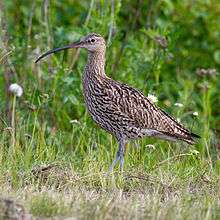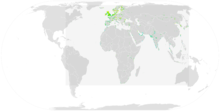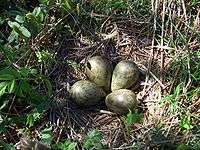Eurasian curlew
The Eurasian curlew or common curlew (Numenius arquata) is a wader in the large family Scolopacidae. It is one of the most widespread of the curlews, breeding across temperate Europe and Asia. In Europe, this species is often referred to just as the "curlew", and in Scotland known as the "whaup" in Scots.
| Eurasian curlew | |
|---|---|
 | |
| Scientific classification | |
| Kingdom: | Animalia |
| Phylum: | Chordata |
| Class: | Aves |
| Order: | Charadriiformes |
| Family: | Scolopacidae |
| Genus: | Numenius |
| Species: | N. arquata |
| Binomial name | |
| Numenius arquata | |
 | |
| Global map of N. arquata reports submitted to eBird Year-Round Range Summer Range Winter Range | |
| Synonyms | |
| |
This is the largest wader in its range, at 50–60 cm (20–24 in) in length, with an 89–106 cm (35–42 in) wingspan and a body weight of 410–1,360 g (0.90–3.00 lb).[2] It is mainly greyish brown, with a white back, greyish-blue legs and a very long curved bill. Males and females look identical, but the bill is longest in the adult female. It is generally not possible to recognize the sex of a single Eurasian curlew, or even several ones, as there is much variation; telling male and female of a mated pair apart is usually possible however.
The familiar call is a loud curloo-oo.
The only similar species over most of the curlew's range is the Eurasian whimbrel (N. phaeopus). The whimbrel is smaller and has a shorter bill with a kink rather than a smooth curve. Flying curlews may also resemble bar-tailed godwits (Limosa lapponica) in their winter plumages; however, the latter have a smaller body, a slightly upturned beak, and legs that do not reach far beyond their tail tips. The Eurasian curlew's feet are longer, forming a conspicuous "point".
The curlew exists as a migratory species over most of its range, wintering in Africa, southern Europe and south Asia. Occasionally a vagrant individual reaches places far from its normal range, such as Nova Scotia[3] and the Marianas.[4][5] It is present all year in the milder climates of Ireland and the United Kingdom and its adjacent European coasts.
Etymology
The English name "curlew" is imitative of the Eurasian curlew's call, but may have been influenced by the Old French corliu, "messenger", from courir , "to run". It was first recorded in 1377 in Langland's Piers Plowman "Fissch to lyue in þe flode..Þe corlue by kynde of þe eyre".[6] The genus name Numenius is from Ancient Greek νουμήνιος, noumēnios, a bird mentioned by Hesychius. It is associated with the curlew because it appears to be derived from neos, "new" and mene "moon", referring to the crescent-shaped bill. The species name arquata is the Medieval Latin name for this bird, derived from Latin arcuatus, "bow-shaped", and again referring to the shape of the bill.[7]
Subspecies
There are three subspecies of the Eurasian curlew:
- N. a. arquata, (Linnaeus, 1758): breeds in west, north & central Europe.
- N. a. orientalis, Brehm, 1831: breeds in west & central Siberia through to Northeast China.
- N. a. suschkini, Neumann, 1929: breeds from western Kazakhstan to southwestern Siberia.
It is generally wary. Highly gregarious outside the breeding season, the Eurasian curlew feeds by probing soft mud for small invertebrates, but will also pick small crabs and earthworms off the surface if the opportunity arises.
 clutch of eggs
clutch of eggs- Eggs Museum Wiesbaden, Germany
_in_flight.jpg)
- skull
The nest is a bare scrape on taiga, meadow, and similar habitats. Each curlew lays between 3 and 6 eggs in April or May and incubates them for about a month until they begin to hatch. It has been observed that curlews tend to nest close to common kestrel's nests, as they can offer protection from other predators, such as corvids, even though kestrels also predate curlew nests [8].
The curlew is one of the species to which the Agreement on the Conservation of African-Eurasian Migratory Waterbirds (AEWA) applies.
Formerly classified as a species of Least Concern by the IUCN, it was suspected to be rarer than generally assumed. Following the evaluation of its population size, the classification was found to be incorrect, and it was consequently promoted to Near Threatened status in 2008. Though it is a common bird, its numbers are noticeably declining,[9] particularly in the United Kingdom and Ireland, which have about a quarter of the global population. In the twenty years up to 2016, the population is estimated to have declined by more than 50% in England and Scotland, more than 80% in Wales, and more than 90% in Ireland. At the end of 2015 it was placed on the United Kingdom's red list of most endangered bird species.[10]
Gallery
 Eurasian Curlew at Chilika Lake, India
Eurasian Curlew at Chilika Lake, India
References
- BirdLife International (2012). "Numenius arquata". IUCN Red List of Threatened Species. 2012. Retrieved 26 November 2013.CS1 maint: ref=harv (link)
- Dunning, John B. Jr., ed. (1992). CRC Handbook of Avian Body Masses. CRC Press. ISBN 978-0-8493-4258-5.
- "Eurasian Curlew". Birds of Nova Scotia. Natural History Museum of Nova Scotia (NHMNS). 1998. Archived from the original on 28 August 2008. Retrieved 23 May 2008.
- Wiles, Gary J.; Worthington, David J.; Beck, Robert E. Jr.; Pratt, H. Douglas; Aguon, Celestino F.; Pyle, Robert L. (2000). "Noteworthy Bird Records for Micronesia, with a Summary of Raptor Sightings in the Mariana Islands, 1988–1999" (PDF). Micronesica. 32 (2): 257–284. Archived from the original (PDF) on 2013-04-23.
- Wiles, Gary J.; Johnson, Nathan C.; de Cruz, Justine B.; Dutson, Guy; Camacho, Vicente A.; Kepler, Angela Kay; Vice, Daniel S.; Garrett, Kimball L.; Kessler, Curt C.; Pratt, H. Douglas (2004). "New and Noteworthy Bird Records for Micronesia, 1986–2003". Micronesica. 37 (1): 69–96. Archived from the original on 2009-05-05.
- "Curlew". Oxford English Dictionary (3rd ed.). Oxford University Press. September 2005. (Subscription or UK public library membership required.)
- Jobling, James A (2010). The Helm Dictionary of Scientific Bird Names. London: Christopher Helm. pp. 56, 276. ISBN 978-1-4081-2501-4.
- Norrdahl, K., Suhonen, J., Hemminki, O. et al. Oecologia (1995) 101: 105. https://doi.org/10.1007/BF00328906
- "Species factsheet: Numenius arquata". www.birdlife.org. BirdLife International. 2008.
- McCarthy, Michael (22 February 2016). "Nature Studies: If we lose the curlew, we lose the sound of the British wilderness". The Independent. Retrieved 11 April 2017.
External links
| Wikimedia Commons has media related to Numenius arquata. |
- Conserving breeding curlews in Southern England
- (Eurasian) curlew species text in The Atlas of Southern African Birds
- Video of a Curlew Probing the Mud in the Thames Estuary
- "Numenius arquata". Avibase.

- "Eurasian curlew media". Internet Bird Collection.
- Eurasian curlew photo gallery at VIREO (Drexel University)
- Interactive range map of Numenius arquata at IUCN Red List maps
- Audio recordings of Eurasian curlew on Xeno-canto.
- Numenius arquata in the Flickr: Field Guide Birds of the World
- Eurasian curlew media from ARKive

